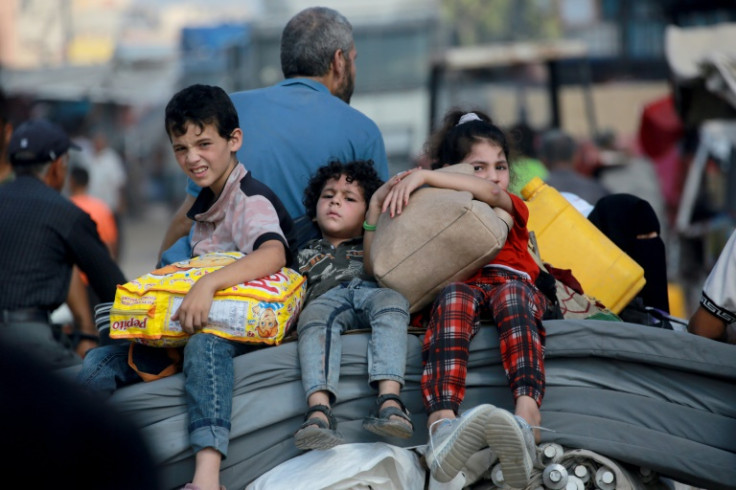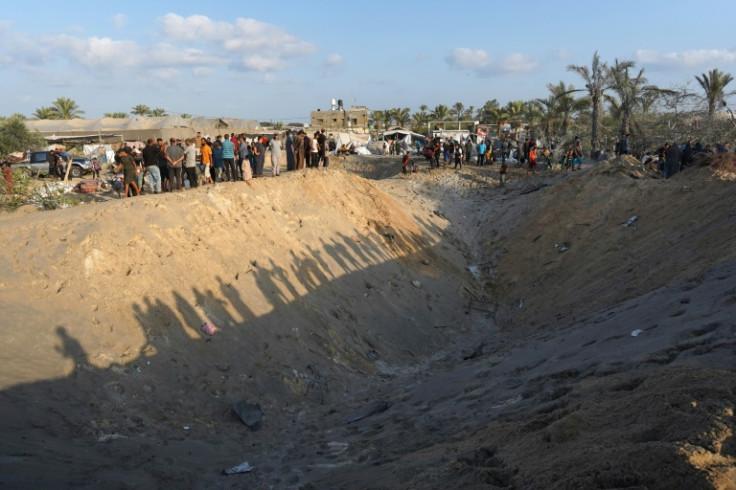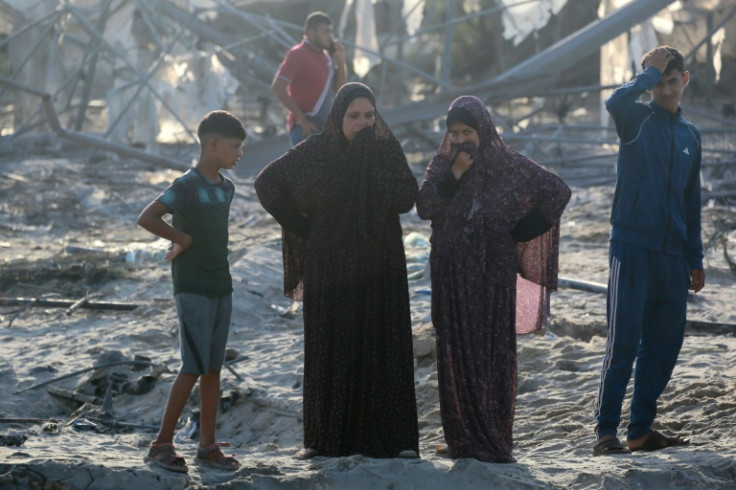Gaza Agency Says Israeli Strike Kills 40 In Humanitarian Zone

Gaza's civil defence agency said an Israeli strike Tuesday on a humanitarian zone in the Palestinian territory killed 40 people, with the Israeli army saying it had targeted a Hamas command centre in the area.
The strike hit Al-Mawasi -- in Gaza's southern province of Khan Yunis -- which was designated a safe zone by the Israeli military early in the war, with tens of thousands of displaced Palestinians seeking refuge there.
Israel's military has carried out occasional operations in and around the area, including a strike in July that it said killed Hamas military chief Mohammed Deif, and which Gaza health authorities said killed more than 90 people.
Egyptian, Qatari and US efforts to broker an elusive ceasefire have focused on securing the release of hostages taken by Palestinian militants on October 7 in exchange for a pause in Israel's offensive.
Israeli Defence Minister Yoav Gallant said a truce and hostage release deal would give Israel a "strategic opportunity" to address other security challenges, adding that Hamas "as a military formation no longer exists".
In Gaza, civil defence official Mohammed al-Mughair said 40 dead and 60 wounded were taken to nearby hospitals following the strike on Al-Mawasi early Tuesday.
"Our crews are still working to recover 15 missing people as a result of targeting the tents of the displaced in Mawasi, Khan Yunis," Mughair told AFP.
Civil defence spokesman Mahmud Basal said people sheltering in the camp in the dunes along the Mediterranean coast had not been warned of the strike.
The strike left behind "three deep craters", he said, adding: "There are entire families who disappeared under the sand."
Survivors of the strike scambled to retrieve their belongings from the rubble, including mattresses and clothing, an AFP journalist reported.
"They told us to come to Al-Mawasi, so we came to Al-Mawasi, we settled here. The area was bombed without prior warning, they didn't ask us to flee to a safer area or anything," a Palestinian man told AFP without giving his name.
"The terrorist organisations in the Gaza Strip continue to systematically abuse civilian and humanitarian infrastructure, including the designated humanitarian area, to carry out terrorist activity against the State of Israel and IDF (Israeli army) troops," it added.
In a later statement, the military also questioned the toll provided by authorities in Gaza, saying that the numbers "do not align with the information held by the IDF".
The statement named several Palestinian militants it said were killed in the strike, describing them as "directly involved in the execution of the October 7 massacre" that sparked the war in Gaza.
Hamas said in a statement that claims its fighters were present at the scene of the strike were "a blatant lie".
Hamas's October 7 attack on Israel that sparked the war resulted in the deaths of 1,205 people, mostly civilians, including some hostages killed in captivity, according to Israeli official figures.
Militants seized 251 hostages during the attack, 97 of whom are still held in Gaza, including 33 the Israeli military says are dead.
Israel's retaliatory offensive in Gaza has killed at least 40,988 people, according to the health ministry in the Hamas-run territory.
The UN human rights office says most of the dead are women and children.
Efforts to secure a truce in the fighting remain stalled, with Hamas demanding a complete Israeli withdrawal from Gaza as part of any deal, while Israeli Prime Minister Benjamin Netanyahu insists troops must remain along the Gaza-Egypt border.
Speaking to foreign journalists, Defence Minister Gallant voiced his support for an agreement to secure a release of hostages.
He also said that nearly a year into the war, Hamas had been reduced to surviving through guerrilla warfare.
"Hamas as a military formation no longer exists. Hamas is engaged in guerrilla warfare and we are still fighting Hamas terrorists and pursuing Hamas leadership," he said.
Since Hamas's attack that sparked the war, Israel has also been engaged in near-daily clashes along its northern border with Lebanon's Iran-backed Hezbollah movement.
The impact of the Gaza war has also been felt in Jordan, half of whose population is of Palestinian origin, and which on Tuesday was voting in a parliamentary election.
"What is happening in Gaza... (the) killing, destruction and tragedies broadcast daily on television, makes us feel pain, helplessness, humiliation and degradation, and makes us forget the elections and everything that is happening around us," said Omar Mohammed, a 43-year-old Jordanian civil servant.


© Copyright AFP 2025. All rights reserved.





















